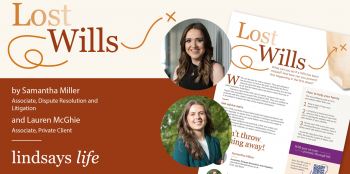On the 29th of August 2012 author J K Rowling was granted planning permission to build a Hogwarts inspired tree house for her children within the grounds of her estate. Susan Law, Partner in Commercial Property at Lindsays, was a guest on the MacAulay & Co radio show on Monday 3rd September 2012 to discuss planning applications and neighbour disputes.
Planning Permission?
It can be difficult to know what types of structures need planning permission. Permitted development for householders was recently revised and the current law came into force in February this year, with the idea being that more types of works can be done to your own property so long as certain criteria is met and you do not live in a listed building or conservation area.
The most obvious starting place is with the humble garden fence. Although most people would not think twice about installing a boundary fence, there are specific rules about the height of fences and hedges. If your garden is within 20 metres from a road, the garden fence or hedge cannot be higher than 1 metre. If the garden is more than 20 metres from the road, the fence or hedge can be up to 2 metres high. If you wish to install a higher fence or hedges, you need to seek planning permission. Another common issue which you might need to get planning permission for is decking. The general rule is that you can only install decking less than 0.5 metres off the ground and no more than 2.5 metres high. This will be perfectly adequate for many people who wish to install decking but it has caught a few people out where decking has been installed on a slope and is therefore higher off the ground than the 0.5 metre maximum. In those situations planning permission must be granted.
Ground floor extensions to a property have to be in the back garden.
Where the proposed extension will be within 1 metre of the boundary line, the extension cannot project more than 3 metres from the house and, if the boundary is more than 1 metre away, the extension can project 4 metres. All extensions cannot be more than 4 metres high in total and no larger than the footprint of your existing dwellinghouse. If the extension is to be bigger, planning permission will have to be sought.
Garages, sheds and tree house also have to be in your back garden. They cannot take over more than 50% of the total garden space. They cannot be more than 4 metres high and can only be 2.5 metres high if the building is to be within 1 metre of the boundary line. In conservation area or in the garden of a listed building, the garage, shed or tree house cannot be more than 4 metres square.
What else?
Planning permission is not the only type of consent you need to think about. Sometimes fence and hedge heights and other building restrictions are specifically prohibited in you the title deeds for your property. In particular, it is common practice for newly built estates to be prescriptive about such matters as the type of materials a fence must be made of, what types of extensions can be built and even the colour of front doors.
You also need to consider if what you are doing needs a building warrant or any consent, such as to do with drainage, listed building consent or conservation area consent.
When can we do this work?
We often get asked about whether or not there are restrictions about working hours for labourers working at a residential property. This is definitely something which should be considered before any work is carried out. It is often the case that working hours are specified in the planning permission so you should check that is you have one. If not, we would recommend that you stick to reasonable hours. If your neighbours make a complaint to your local council, it is possible that the local council will intervene and specific working hours.
Neighbourhood Disputes?
If you are having difficulty with your neighbours in relation to building work, you should ensure that you follow all the necessary protocols to limit the possible complaint which could be made.
However, if the problems with your neighbour are not limited to a specific issue, you do have some options. If you think there is still a chance that you and your neighbours could discuss the problems and come to a solution, mediation may be the best route. This can be provided by specialised mediators who are often solicitors or other professionals. Most Local Authorities will provide a free neighbour dispute resolution service which can facilitate a successful outcome for all parties.
We get a lot of calls about a variety of neighbourhood issues, such as:
- Neighbours sectioning off an area of ground within a shared garden
This is not allowed as it must be possible for all parties to have access to the whole garden area. If your neighbour has sectioned off an area of ground, it is possible to make an application to the court to make your neighbour to dismantle any fence. - Over-hanging trees and roots
You are entitled to lope branches and cut roots which have strayed over the boundary line into your garden. However, if you do so, you will require to return the cuttings to your neighbour, as they are their property. - Hedges blocking sunlight
You are not entitled to trim the top of your neighbours’ hedge. If you think the hedge is too high, you should report the matter to your Local Authority. At the moment there is a bill being drafted in relation to hedges, called the ‘High Hedges Bill’. The legislation will most likely cover matters such as authorising the council to step in and prune privately owned hedges after a complaint is made and allowing the Council charge the owner of the hedge a fee for doing so. - Excessive noise complaints
If your neighbour is excessively loud on a regular basis, you can contact the Environmental Health Department within your Local Authority. You can report matters such as shouting, door slamming loud music. You neighbours will then be contacted to discuss the issues at hand and if the noise persists, the Local Authority may apply for an Anti-Social Behaviour Order (ASBO). It is also possible to make a report in relation to commercial neighbours if they are, for example, loading lorries during the night or you can hear music from bars and clubs.
In all instances it is sensible to consult your solicitor before you carry out any alterations to the interior or exterior of your property or consult them if you are currently in a dispute with a neighbour. Listen to the excerpt of the 3 September 2012 MacAuley & Co show here (this section is on at 1 hour 16 minutes)


























